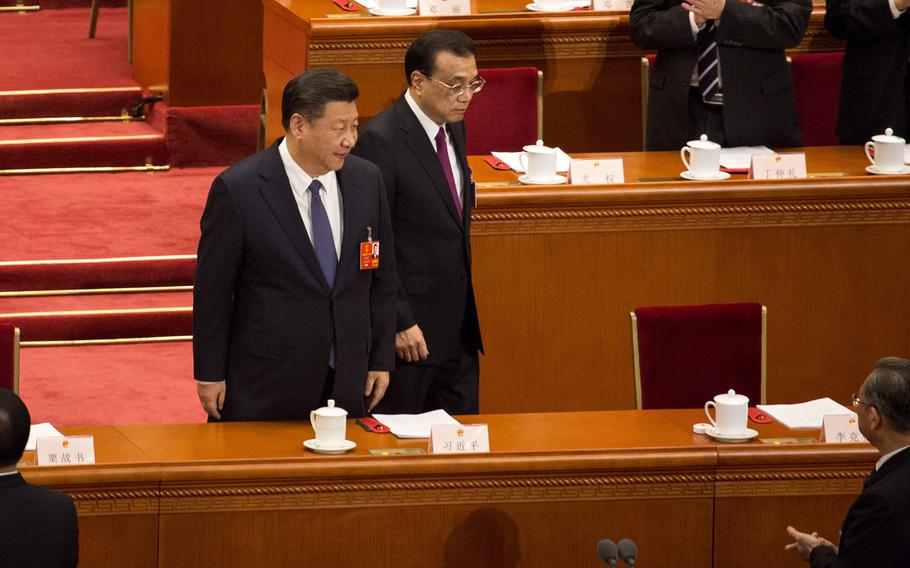
Xi Jinping and Li Keqiang. (Giulia Marchi)
The sudden death of ex-Premier Li Keqiang has handed his old boss Xi Jinping fresh risks, as an outpouring of emotion for a popular reformer threatens to spill into discontent over a slowing economy.
Li’s death from a heart attack, age 68, comes as a property crisis threatens to wipe out the savings of millions and unemployment hits a record high among China’s youth.
Xi’s recent firing of his defense and foreign ministers has already raised questions around the stability of his government, and any attempts to use the occasion to express dissent could inflame those concerns. Chinese citizens have used the sudden deaths of Communist Party leaders in the past to challenge their grip on power.
“Xi will probably try to get in front of any potential use of Li’s death to make political arguments, by leading the mourning for his former colleague,” said Neil Thomas, a fellow for Chinese politics at the Asia Society Policy Institute’s Center for China Analysis. “There’ll be a concerted effort to suppress attempts to use Li’s death to oppose his leadership.”
The passing of Zhou Enlai in 1976 was a catalyst for widespread protests that year. A similar episode in April 1989 — the death of ousted Communist Party official Hu Yaobang — prompted an outpouring of public grief that led to pro-democracy protests in Tiananmen Square.
Communist Party leaders sent troops into Tiananmen Square and surrounding streets to violently clear those protesters, with estimates of the death toll ranging from hundreds to as many as 2,600.
Xi has recent experience in managing such challenges. President Jiang Zemin’s death last year on Nov. 30 came at another sensitive moment, days after rare nationwide protests against China’s rigid Covid controls. Those street demonstrations even included calls for the Chinese leader’s removal.
Xi abruptly lifted his Covid Zero policy days after Jiang’s death, jettisoning key tenets of his virus elimination strategy as he tried to quell public discontent.
Jiang’s funeral was a heavily scripted affair. The people that lined the streets of Shanghai and Beijing to watch his hearse pass by apparently organized by the government. Photos that circulated online seemed to show people being bussed to specific locations.
Chinese Foreign Ministry spokeswoman Mao Ning said Li’s funeral arrangements would be announced “in due time” at a regular press briefing in Beijing on Friday. “We mourn over the tragic passing away of Comrade Premier Li Keqiang due to a sudden heart attack,” she added.
Man of the people
Many users on China’s microblogging platform Weibo, where the news of his death was viewed some 1.3 billion times on Friday, expressed regret that Li hadn’t lived a longer life.
One user wrote that people can identify with Li’s story, as Chinese citizens are also “trying to pull through but have been continuously losing ground during the last 10 years.”
During Li’s decade as premier he was sidelined as Xi took over key responsibilities traditionally reserved for the premier and amassed the most power of any leader in China since Mao Zedong. Nostalgia for Li’s vision of a more open China could resonate with those frustrated with the Chinese leader’s more inward-looking era of slower growth and greater focus on national security.
Li was also popular for being a rare candid voice in a sea of terse propaganda speak. In 2020, for example, he set off a nationwide debate on poverty alleviation, after complaining two-fifths of China’s population’s earned “not even enough to rent a room in a medium-sized Chinese city.”
Perhaps in a bid to avoid lingering speculation around Li, the ruling Communist Party announced the former premier’s death hours after he died, according to timing provided in a statement on the government’s website. By contrast, rumors of Jiang’s death were circulating online for weeks before being made public.
Beijing’s initial announcement that an obituary “will be issued later” suggests the party was caught off-guard by his death, said Neo Wang, Evercore ISI’s New York-based managing director for China research.
Joseph Torigian, an assistant professor at the American University, wrote on X, the social media platform formerly known as Twitter, that the immediate task facing the Chinese leadership was to come up with an obituary that pleases Li’s family, suits the regime’s political agenda, and does not inflame popular sentiment.
“You want to give due credit, but at the same time, Xi Jinping has accentuated a narrative about all of his accomplishments and how much he was in control,” Torigian told Bloomberg. “So, how do you square that while doing justice to Li Keqiang’s career will probably be something that they’re trying to figure out.”
Adam Ni, publisher of the China Neican newsletter on Chinese politics, said that while Li’s death could turn out to be an “important and delicate political moment,” the overall effects will likely be moderate.
“I don’t think there is enough discontent to cause political tides like the deaths of Zhou and Hu,” Ni said. “I suspect the average Chinese would have forgotten about Li’s death by this time next month.”
With assistance from Xiao Zibang and Jacob Gu.